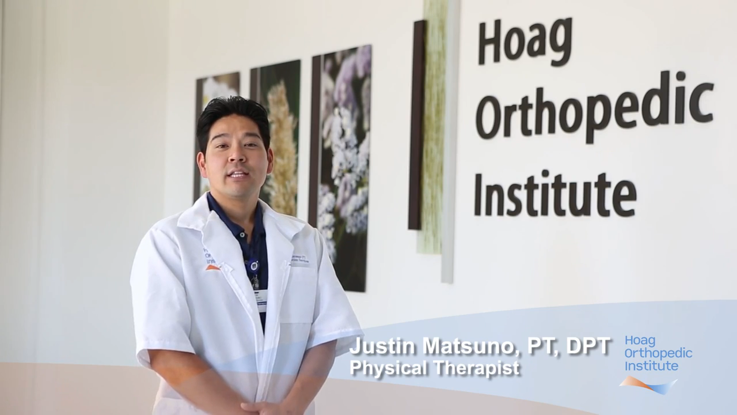Sciatica
The Center for Spine at Hoag Orthopedic Institute: Award-Winning Orthopedic-Only Hospital
The Center for Spine at Hoag Orthopedic Institute is an orthopedic-only hospital that specializes in treating a range of conditions and injuries that affect the neck, back, and spine – all of which can have an impact on other areas of the body and a person’s overall health. This is especially true when it comes to sciatica, the term used to describe pain, numbness, and tingling which runs down one or both of the legs. Sciatica stems from issues affecting the lower back, where pain can travel down the sciatic nerve, the largest nerve in the body, through the buttock and the back of the leg.
Patients with sciatic nerve pain can experience pain and various symptoms that affect all aspects of their daily life and their ability to enjoy activities they once did. These symptoms can include chronic pain that usually affects one buttock / leg, intensified pain with sitting, standing, or walking, searing or tingling sensations, and radiating pain that may extend into the foot or toes.
Treating Sciatica
Because sciatica is a symptom of an underlying medical condition, there are many lower back problems that can lead to painful symptoms and decreased mobility. As such, treatment is targeted to the underlying problem rather than the symptoms a person experiences.
Treatment for common causes of sciatica:
- Degenerative disc disease – A condition characterized by the natural wear and tear that comes with aging, degenerative disc disease results in weakened spinal discs that may protrude into the spinal column and place pressure on spinal nerves. This condition can be treated through non-surgical means, including pain management and physical therapy, but may require surgery when patients continue to experience pain and limited motion.
- Herniated or slipped discs – Herniated and slipped discs commonly affect the lower back (lumbar), and occur when the spinal disc, or its soft inner portion, protrude out of the disc and into the spinal column, creating pressure on nerve roots, inflammation, and pain. In severe cases, as well as chronic cases where conservative care does not provide relief, surgery may be required to remove the affected disc or bone fragments, relieve pressure, or fuse vertebrae.
- Spinal stenosis – Spinal stenosis occurs when the spinal canal narrows as a result of congenital disorders, aging, and / or arthritis, and can cause sciatica nerve pain when it affects the lumbar region of the spine (lower back). When non-invasive methods do not provide relief, surgical procedures will focus on decompression (removal of bone spurs, bones, or ligaments that place pressure on nerves) and / or fusion to join vertebrae in the affected area.
- Spondylolisthesis – A spinal disorder in which a vertebra slides over the bone below it, spondylolisthesis typically affects the lower back (lumbar) and can commonly cause sciatica. Rest, physical therapy, pain management, and bracing may be used to treat the condition initially, but more severe grade slippage, slippage that progressively worsens, and conditions that do not respond to non-surgical treatment may necessitate surgery, such as spinal fusion.
Our Orange County spine doctors at the Center for Spine at Hoag Orthopedic Institute leverage their expertise to diagnose your underlying issue and provide the targeted non-surgical and / or surgical treatment needed to get you back to an active and healthy life. Because we prioritize personalized care, patients also have access to a dedicated spine nurse navigator to help them prepare for their surgery and recoveries.
Find a Spine Doctor Online
Sciatica pain can intrude upon your daily life and keep you sidelined from the activities you enjoy, which is why it is vital to work with specialists and support staff who value comprehensive and effective care using the most advanced techniques.
To find a spine doctor with the Center for Spine at Hoag Orthopedic Institute, browse our online physician directory and schedule an appointment!
-
 Back to Driving Spine
Back to Driving Spine"Procedure: Complex Spinal Surgery Watching TV, taking long walks, getting up out of a ..."
Read More -
 Back to Enjoying Life Spine
Back to Enjoying Life Spine"Procedure: Spinal fusion Jonathan Dibiasi and his family love spending time at their ..."
Read More -
 Back to Running Spine, Sports Medicine
Back to Running Spine, Sports Medicine"“I can’t believe I’m walking, let alone running,” says car crash survivor, seven-time ..."
Read More -
 Back to Savoring Every Day Hand & Wrist, Spine
Back to Savoring Every Day Hand & Wrist, Spine"Procedures: Spinal Surgery: January 16, 2017; Right Wrist Fusion: January 12, 2018 ..."
Read More -
 Back to Painting Spine
Back to Painting Spine"Procedure : Multi-level Spinal Fusion At age 69, lifelong professional artist ..."
Read More -
 Back to Wearing Cowboy Boots Spine
Back to Wearing Cowboy Boots Spine"For two years, Sally Greer spent most of her time on her couch, and gained 130 pounds ..."
Read More -
 Back to Being Healthy Spine
Back to Being Healthy Spine"I would like to get a message to a couple of your staff members and their supervisor. ..."
Read More -
 Back to Dancing Spine
Back to Dancing Spine"For the past decade, Irvine aerospace engineer Shoja’s zest for life led him to grace ..."
Read More -
 Back to a Better Life Spine
Back to a Better Life Spine"I had spine surgery by Dr. Richard Lee on January 3rd. It appears to have been been ..."
Read More










